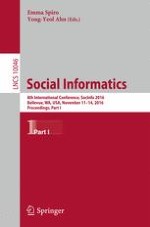2016 | OriginalPaper | Buchkapitel
Analysing RateMyProfessors Evaluations Across Institutions, Disciplines, and Cultures: The Tell-Tale Signs of a Good Professor
verfasst von : Mahmoud Azab, Rada Mihalcea, Jacob Abernethy
Erschienen in: Social Informatics
Aktivieren Sie unsere intelligente Suche, um passende Fachinhalte oder Patente zu finden.
Wählen Sie Textabschnitte aus um mit Künstlicher Intelligenz passenden Patente zu finden. powered by
Markieren Sie Textabschnitte, um KI-gestützt weitere passende Inhalte zu finden. powered by
